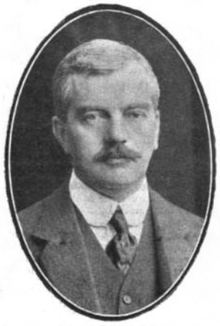This article needs additional citations for verification. (May 2012) |
Sir Calthrop Guy Spencer Calthrop, 1st Baronet (26 March 1870 – 23 February 1919) was a British railway manager.[1]
Guy Calthrop | |
|---|---|
 In The Railway News, 8 June 1918 | |
| Born | 26 March 1870 Uppingham, Rutland, England |
| Died | 23 February 1919 (aged 48) London, England |
| Occupation | Railway manager |
Biography
editBorn in Uppingham, Rutland, his brother was Everard Calthrop, railway engineer. He entered the London and North Western Railway (LNWR) as a Cadet at the age of 16 in 1886. In 1892 he was appointed outdoor assistant to the Superintendent of the Line at Euston, and in 1894. In 1901 he became personal assistant to Sir Frederick Harrison. However, in 1902 Calthrop left the LNWR to take up a position as General Superintendent of the Caledonian Railway, and in 1908 was promoted to General Manager.[1] In 1910 Calthrop left Britain to become General Manager of the Buenos Aires and Pacific Railway.
In 1913 Calthrop returned to Britain and the LNWR, where he was appointed General Manager of the LNWR in succession to Sir Robert Turnbull in 1914. During the First World War, Calthrop was seconded by the Government, who appointed him Controller of Mines. For this service, Calthrop was made a baronet of Croxley House, Hertfordshire in 1918.[2][3] He died less than a year later however on 23 February 1919, and his baronetcy became extinct upon his death.[4]
References
edit- ^ a b "Guy Calthrop". Glasgow Digital Library. Retrieved 24 May 2012.
- ^ "No. 30958". The London Gazette. 18 October 1918. pp. 12249–12250.
- ^ "Rhondda A Viscount on Birthday List" (PDF). The New York Times. London (published 3 June 1918). 2 June 1918. p. 7. Retrieved 21 August 2024.
- ^ "Death of Sir Guy Calthrop". The Times. London. 24 February 1919. p. 28. Retrieved 21 August 2024 – via Newspapers.com.